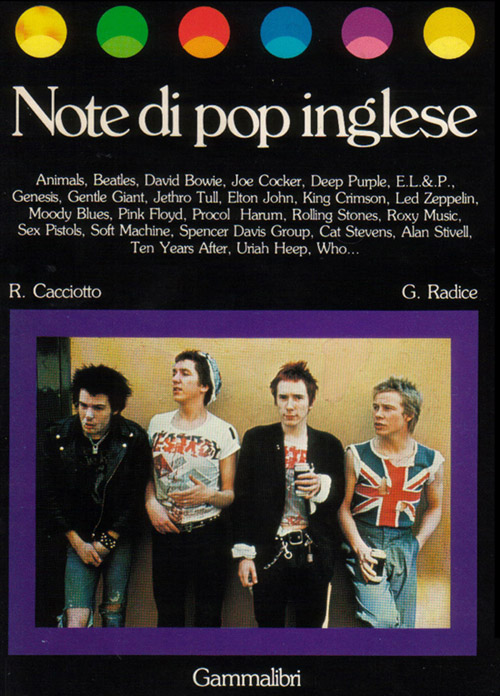
Procol HarumBeyond
|
||||||||||
| Scroll down the page to read the Procol article from this book, in Italian and in English |  |
|
The check point was written with the ink of nostalgia in the minds of an entire generation: A Whiter Shade of Pale disturbed, in May 1967, the (relatively) calm waters of English pop with a most beautiful harmony, all based (it was discovered later) on the solemn austerity of Bach’s Air on the G String. It was Matthew Fisher’s organ-playing which conquered Europe and America, but the overall sound-signature was that of a band which had never been heard, put together casually by the insertion of a small ad in a newspaper by Gary Brooker, ex-pianist of the Paramounts, a minor beat group which operated in Southend in the mid-60s and included Chris Copping, BJ Wilson, and Robin Trower. Responses to the ad came from Bobby Harrison (drums), David Knights (bass), Ray Rowyer [sic] (guitar), and indeed Fisher. But above all Brooker worked with Keith Reed [sic], a strange intellectual figure who was to give the group, then and in the years to come, some of the finest texts in all pop. From this very collaboration came A Whiter Shade of Pale. It was a staggering success, but for the new-born Procol Harum it was to become a gilded cage in which they would remain shut, unable to shake off that coating of ‘classicism’, earned with that perfect piece of music. The internal equilibrium shattered at once. Rowyer and Harrison left, and Brooker summoned his old comrades from the ‘Paramounts days’, Trower (guitar) and Wilson (drums). The second single Homburg was also a success, constructed along the same classical lines, but it was not widely noticed that the first LP (also in 1968) concealed behind its superficial Baroquisms a pop music that was already mature and full of gusto. Shine on Brightly, the same year, and A Salty Dog, in 1969, continued in the same direction. They are both very fine albums, with Brooker carving out refined sounds and Reed, by now a firm fixture with the band, filling out the soundscapes with notable literary tracts. However, for the fans who went to see them Procol Harum remained ‘that A Whiter Shade of Pale lot’, to such an extent that the band was plunged into a quite understandable identity crisis. Fisher left, followed swiftly by Knights. To replace them came another ex-Paramount, Chris Copping, just at a time when Gary Brooker seemed uncertain as to which direction the band should follow. It was Trower who took the upper hand, tilting the balance towards rock. Home, from 1970, and Broken Barricades, from 1971, illustrate this period well. They are two untypical works, with surging rhythms (Wilson creates a remarkable background), bombastic guitars, and rock-blues numbers taking the place of the leader’s gentle ballads. The result was good, however, but even this new equilibrium was destroyed by the defection of Trower, who left to pursue his rock desires first with Jude and then with his own band. The new names now were guitarist Dave Ball (ex-Big Bertha) and bassist Alan Cartwright (ex-Every Which Way) but Procol Harum found itself once again in a grave crisis of inspiration. Their return to recording was the live album from their Canadian concert with the Edmonton Sinphony [sic] Orchestra: a disappointing experiment, with dreadful homages to some of the ‘classic’ numbers played with little conviction, somewhere between the electric strutting of the band and the rhetorical symphonism of the orchestra. This was the band’s feeblest period. It would take almost two years for the resurrection to come. During this time Ball left and Mick Grabham (ex-Cochise) joined, appearing immediately to be the right guitarist for Procol Harum. In 1973 the band was in dazzling form; Brooker was back to his best and was leading operations with a succession of distinguished compositions. The pinnacle of this art of synthesis between pop and classical bore the title Grand Hotel, a brilliant album accomplished with extreme class. The group seemed to have found a precise identity; Brooker draped the songs with the most refined atmospheres which Grabham set off with measured electric charges. Without scaling such peaks again, Procol Harum have followed the same road these last five years, confirming themselves as masters of a precious art. Exotic Birds and Fruit (1975), Procol’s Ninth (1976), and Something Magic (1977) are further stopping-places of a project which, various vicissitudes notwithstanding, will forever be a good cut above the mediocre output of today’s pop music bear-garden. (trans. Martin Clare ... grazie!) |
 |